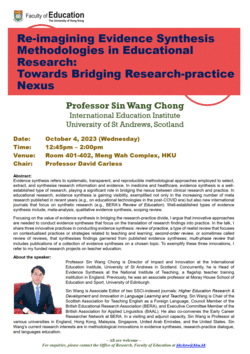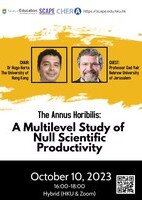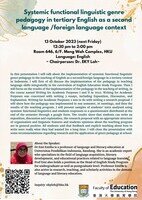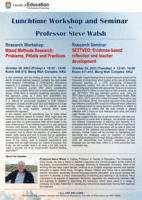Seminar: Re-imagining Evidence Synthesis Methodologies in Educational Research: Towards Bridging Research-practice Nexus
Seminar
Date
October 04, 2023 (Wed)
Venue
Time
12:45 PM - 2:00 PM
Speaker

Re-imagining Evidence Synthesis Methodologies in Educational Research: Towards Bridging Research-practice Nexus
Professor Sin Wang Chong
International Education Institute
University of St Andrews, Scotland
Date: October 4, 2023 (Wednesday)
Time: 12:45pm – 2:00pm
Venue: Room 401-402, Meng Wah Complex, HKU
Chair: Professor David Carless
Abstract:
Evidence synthesis refers to systematic, transparent, and reproducible methodological approaches employed to select, extract, and synthesise research information and evidence. In medicine and healthcare, evidence synthesis is a well-established type of research, playing a significant role in bridging the nexus between clinical research and practice. In educational research, evidence synthesis is gaining visibility, exemplified not only in the increasing number of meta research published in recent years (e.g., on educational technologies in the post-COVID era) but also new international journals that focus on synthetic research (e.g., BERA’s Review of Education). Well-established types of evidence synthesis include, meta-analysis, qualitative evidence synthesis, scoping review.
Focusing on the value of evidence synthesis in bridging the research-practice divide, I argue that innovative approaches are needed to conduct evidence syntheses that focus on the translation of research findings into practice. In the talk, I share three innovative practices in conducting evidence synthesis: review of practice, a type of realist review that focuses on contextualised practices or strategies related to teaching and learning; second-order review, or sometimes called review of reviews, that synthesises findings garnered from published evidence syntheses; multi-phase review that includes publications of a collection of evidence syntheses on a chosen topic. To exemplify these three innovations, I refer to my funded research projects on teacher education.
About the speaker:
Professor Sin Wang Chong is Director of Impact and Innovation at the International Education Institute, University of St Andrews in Scotland. Concurrently, he is Head of Evidence Synthesis at the National Institute of Teaching, a flagship teacher training institution in England. Previously, he was an associate professor at Moray House School of Education and Sport, University of Edinburgh.
Sin Wang is Associate Editor of two SSCI-indexed journals: Higher Education Research & Development and Innovation in Language Learning and Teaching. Sin Wang is Chair of the Scottish Association for Teaching English as a Foreign Language, Council Member of the British Educational Research Association (BERA), and Executive Committee Member of the British Association for Applied Linguistics (BAAL). He also co-convenes the Early Career Researcher Network at BERA. In a visiting and adjunct capacity, Sin Wang is Professor at various universities in England, Hong Kong, Malaysia, Singapore, United Arab Emirates, and the United States. Sin Wang’s current research interests are in methodological innovations in evidence syntheses, research-practice dialogue, and languages education.
~ All are welcome ~
For enquiries, please contact the Office of Research, Faculty of Education at hkchow@hku.hk



